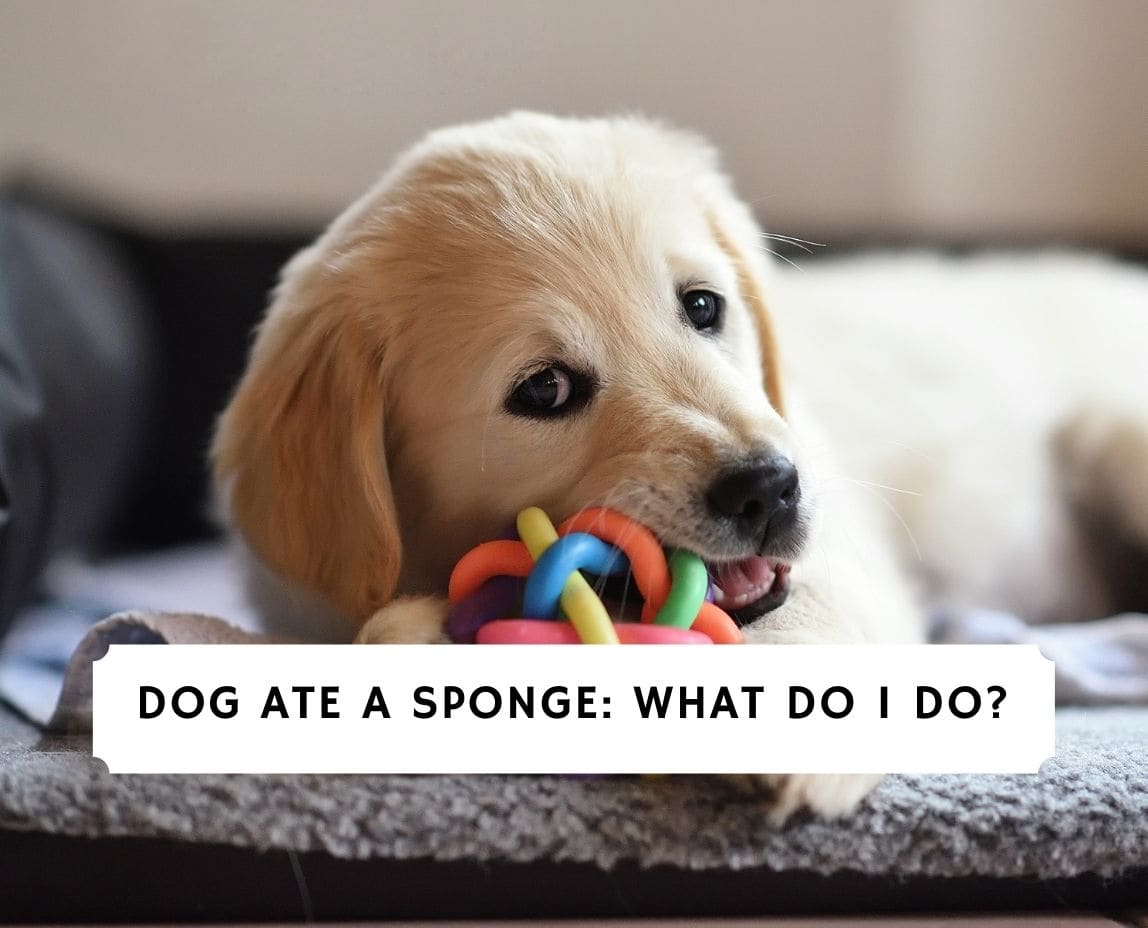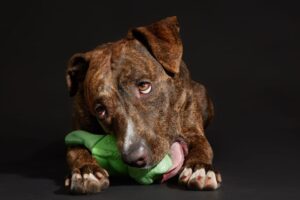If you learn that your dog ate a sponge, you may be inclined to panic. Dogs do have an uncanny way of getting into things they shouldn’t, and a sponge is no exception! Sometimes they even smell like food, further enticing your curious canine companion.
Your pup’s curious behavior can be a recipe for trouble. Sponges are squishy, airy, and handy, but they’re certainly not edible. So what should you do if your dog ate a sponge? Read on to learn more about the next best steps.
Other things dogs eat without knowing: My Dog Ate a Baby Wipe and My Dog Ate Coconut Oil.
What Are Sponges Made Out Of?
Look in any kitchen, bathroom, or other home cleaning supplies kit and you’re bound to find a sponge. These versatile and affordable cleaning tools are helpful in cleaning up messes, leaving surfaces shiny and clean. Much of their magic comes from the material from which a sponge made.
Synthetic sponges are made out of a squishy, porous material called cellulose. Fibers and sodium sulfate are also used to form the sponge. Other chemical softeners are added in to help break down the material into the right feel and flexibility. While sponges may come in different materials, colors, and textures, their power in cleaning remains the same.
Are Sponges Bad For Dogs?
You may hear that sponges have chemical softeners and sodium sulfate used in the manufacturing process. However, the danger if your dog ate a sponge is actually fairly minimal. Consider the type of sponge your pup ate, what was on the sponge, and the amount ingested. This will help you determine the best course of action.
When chewing on sponges, a small piece or two may break off of the sponge and be ingested by your dog. Most often, this isn’t reason to panic, especially if your dog is large and has consumed non-food items before. Also knowing the material the sponge is made of can help you determine how serious of a situation this may be for your dog. Most sponges are made of wood pulp, which may be more easily broken down.
However, remember that sponges were designed to absorb liquid. It’s easy for a sponge to “inflate” as it passes through your pup’s system, and this can potentially cause a blockage. A dry sponge in your dog’s mouth, additionally, can pose a choking hazard for your pooch.
Finally, the chemicals or other substances on the sponge will affect how your dog responds. Bleach and other chemicals from the bathroom, for instance, are far more dangerous than simple food scraps from the kitchen.
Dog-Related Articles: Are Dogs Allowed in Home Depot and Are Dogs Allowed in Lowe’s?
My Dog Ate a Sponge: What Do I Do Now?
While dog owners attempt to keep an eye on their dog at most times, sometimes dogs will just sneak into things that they’re not supposed to. If your dog has taken a bite of a sponge, there are some important questions to ask before you begin to worry about their overall health. To help you care for your dog in the best way possible, here we share some next steps to consider if your dog has eaten a sponge. If you know your dog ate a sponge – but only a little bit – your pup will be just fine.
Make sure your dog has plenty of water and continue to monitor your dog’s health. Fiber can also help “move things along.” Should you notice lethargy, vomiting, or other symptoms of distress, please call a vet immediately.
Keep in mind that even if your dog is able to pass the sponge through their system, they may still experience some discomfort. They may experience an upset stomach or other abdominal pains as they digest the sponge. Make sure they are well hydrated and cared for as they move on from their unfortunate taste test. Another thing you’ll want to consider is how your dog consumed the sponge.
If they ate up the sponge whole, there’s a greater chance of it getting stuck in their throat or esophagus, and then into their stomach and digestive system. However, if they chewed up the sponge into tiny bits before consuming it, those tiny pieces have a better chance of making it through the digestive system without causing significant damage. If your dog has consumed a larger piece of sponge, or if your dog is on the smaller side, it may be worth it to give your veterinarian a call.
If sponges inflate too much along the digestive tract, they may become excessively bloated, constipated, and overall miserable. Eventually, this could lead to the sponge needing to be surgically removed. In addition to connecting with your veterinarian, it’s also important to monitor their health for any signs of negative side effects from poor digestion or a blockage in their system. These symptoms include things like constipation, lethargy, and even vomiting. They may also experience diarrhea as they deal with their digestive concerns.
Dog-Related Articles: How Long Will My Puppy Poop Worms After Deworming?
Care For Your Dog And Its Health
While sponges can be a highly versatile and helpful tool for cleaning around the house, they’re not the best treats for your dog. As with most all non-edible items, it’s important to be intentional about monitoring your dog’s health and wellness after you notice they’ve consumed a piece of sponge. Particularly if your dog is small, it’s important to ensure they don’t choke or get a piece of sponge stuck in their digestive system.
Dog Health-Related Articles: Best Dog Allergy Test and Everything You Need To Know About Chicken Allergy in Dogs.
Conclusion For “Dog Ate a Sponge”
If your dog enjoys the texture and feel of sponge-like things, you can buy toys and other chews that are specifically designed for dogs and don’t have materials that can be harmful to them. Show your dog some love and share in enjoying life that doesn’t include eating sponges.
For other food your dog might’ve accidentally eaten, check out:

Dr. Sabrina Kong graduated from the Royal Veterinary College in England in 2016 and has been working at a small animal clinic in Northern California since then. She grew up in the Bay Area and got her bachelor’s degree from Cal Poly San Luis Obispo. She also became a Certified Canine Rehabilitation Practitioner through a program at the University of Tennessee.
When she isn’t in the clinic taking care of her four-legged patients, she enjoys traveling and trying new foods with her friends and her three-legged dog, Apollo. She adopted Apollo from her clinic when he was a puppy with numerous health issues. Dr. Kong truly cares about taking care of animals.





